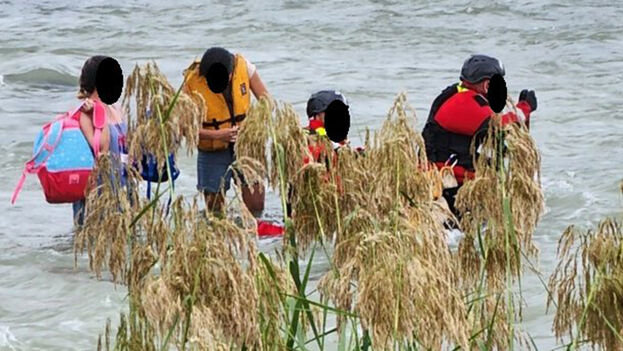
![]() 14ymedio/EFE, Havana, 2 November 2022 — The United States Border Patrol rescued two Cuban women, a mother and daughter, who were trapped in the Río Grande, in the Mexican city of Reynosa, south of Texas. According to the chief officer of the Valley sector, Gloria Chávez, the women were “abandoned” by coyotes 320 feet from the Anzaldúas diversion dam.
14ymedio/EFE, Havana, 2 November 2022 — The United States Border Patrol rescued two Cuban women, a mother and daughter, who were trapped in the Río Grande, in the Mexican city of Reynosa, south of Texas. According to the chief officer of the Valley sector, Gloria Chávez, the women were “abandoned” by coyotes 320 feet from the Anzaldúas diversion dam.
With the support of the team of Firefighters from Mission, Texas, the “rescue in fast and shallow waters” was carried out, Chávez explained.
Mexican media specified that the Cubans were trapped “after the gates of the diversion dam were opened and released water,” so they dialed 911 requesting help.
Between October 2021 and last September, the Border Patrol rescued 22,014 migrants, 72% more than in 2021. According to data from the Office of Customs and Border Protection (CBP), in this same period, 853 deaths of irregular migrants were recorded in their attempts to cross the border between Mexico and the United States.
Regarding the exodus of Cubans, in the fiscal year that just ended in September and began in October 2021, the Border Patrol arrested 224,607 Cubans without documentation, a figure that grew by 471% compared to the same period of a year earlier.
On their journey to the United States through Mexico, Cubans face extortion, robberies, rape and a network of coyotes who, in some cases, abandon them in the desert or in the middle of the Río Bravo, as happened to this Cuban mother and her daughter.
“Smuggling organizations abandon migrants in remote and dangerous areas, which has caused an increase in the number of rescues, but also, tragically, an increase in the number of deaths,” CBP spokeswoman Cecilia Barreda told CBS News.
The officer emphasized that migrants encounter on their border crossing “extreme heat, and the desert miles they must walk after crossing the border in many areas are relentless.”
By sea, the exodus of balseros [rafters] also reaches alarming figures. This Wednesday, nine Cubans were arrested after disembarking at Biscayne National Park, a nature reserve in the bay of the same name, in Florida.
The head of the Border Patrol in the Miami sector, Walter Slosar, reported that another group with nine Cuban nationals landed on Tuesday at Cocoplum beach, in Marathon. Counting these, there are 110 Cubans who arrived in Florida in the last 48 hours, of which “52 did it in 12 hours.”
The U.S. Coast Guard intercepted 1,132 Cubans last month, a significant figure if you take into account that in the previous twelve months there were 6,182.
Meanwhile, on the crossing through Mexico there is again talk of the formation of caravans seeking to reach the border with the United States. The figure already excedes 100, although many of them are broken up by the immigration authorities.
This Wednesday a new caravan, mostly with Venezuelans, departed from Chiapas, on the southern border of Mexico, for the United States, as a protest 20 days after the announcement of the new U.S. measures to control Venezuela’s migration.
The migrants, who remained in Tapachula Square, on Mexico’s border with Guatemala, demand that the United States revoke the expansion of Title 42, which immediately expels Venezuelans arriving by land to that country.
The South Americans requested free passage and that they be allowed to work because they refuse to return to Venezuela. Migrant Juan Méndez explained that they have been calm and trust that at “any time” the U.S. will reopen the border to Venezuelans.
“We are good people, and what the Mexican authorities do is persecute us as criminals. We are asking Mexico to help us, because now we have no money and have to ask,” he told EFE.
The Venezuelans were joined by migrants from Colombia and Ecuador, such as the Colombian Luis Kevin Montaño, who said that his companions in the caravan are determined to arrive in the United States.
“In my case I’m leaving because of problems. I’m not going because I want to leave my country, but we’re going to walk to get to the United States,” he said.
This is the first migrant caravan to leave in November from the southern border. “We left together, join us, let us continue, we want to work, we are not criminals, we are working people, yes we can, sí se puede,” the foreigners shouted on their journey.
Prior to their departure, the Migration authorities and the National Guard arrived at the park where they were camping to invite them to carry out their procedures, but they rejected the process. The authorities then undertook an immigration control operation in the hotels and streets of Tapachula, where they arrested more than 50 migrants who didn’t prove their right to stay legally.
Translated by Regina Anavy
____________
COLLABORATE WITH OUR WORK: The 14ymedio team is committed to practicing serious journalism that reflects Cuba’s reality in all its depth. Thank you for joining us on this long journey. We invite you to continue supporting us by becoming a member of 14ymedio now. Together we can continue transforming journalism in Cuba.
